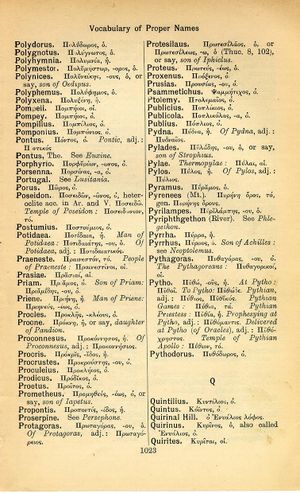Pontus: Difference between revisions
οὐκ ἐπιλογιζόμενος ὅτι ἅμα μὲν ὀδύρῃ τὴν ἀναισθησίαν, ἅμα δὲ ἀλγεῖς ἐπὶ σήψεσι καὶ στερήσει τῶν ἡδέων, ὥσπερ εἰς ἕτερον ζῆν ἀποθανούμενος, ἀλλ᾿ οὐκ εἰς παντελῆ μεταβαλῶν ἀναισθησίαν καὶ τὴν αὐτὴν τῇ πρὸ τῆς γενέσεως → you do not consider that you are at one and the same time lamenting your want of sensation, and pained at the idea of your rotting away, and of being deprived of what is pleasant, as if you are to die and live in another state, and not to pass into insensibility complete, and the same as that before you were born
m (Text replacement - "link={{" to "link={{") |
m (Text replacement - "}}]]" to "}}]]") |
||
| Line 1: | Line 1: | ||
{{WoodhouseENELnames | {{WoodhouseENELnames | ||
|Text=[[File:woodhouse_1023.jpg|thumb | |Text=[[File:woodhouse_1023.jpg|thumb | ||
|link={{filepath:woodhouse_1023.jpg | |link={{filepath:woodhouse_1023.jpg}}]]Πόντος, ὁ. | ||
<b class="b2">Pontic</b>, adj.: [[Ποντικός]]. | <b class="b2">Pontic</b>, adj.: [[Ποντικός]]. | ||
Revision as of 10:11, 15 August 2017
English > Greek (Woodhouse)
Πόντος, ὁ.
Pontic, adj.: Ποντικός.
The, See Euxine.
Latin > English (Lewis & Short)
Pontus: i, m., = Πόντος.
A Lit., the Black Sea, called in full Pontus Euxinus, Mel. 1, 1, 5; 1, 3, 1; Plin. 4, 12, 24, § 75; Cic. Verr. 2, 4, 58, § 129; id. Tusc. 1, 20, 45; 1, 39, 94; Val. Fl. 8, 180 al.—
B Transf., the region about the Black Sea: Medea ex eodem Ponto profugisse, Cic. Imp. Pomp. 9, 22; Ov. Tr. 5, 10, 1.—
2 In partic., Pontus, a district in Asia Minor, between Bithynia and Armenia, the kingdom of Mithridates, afterwards a Roman province, Verg. G. 1, 58; Cic. Agr. 1, 2, 6; 2, 19, 5; id. Imp. Pomp. 3, 7; Vell. 2, 40, 1; Flor. 3, 6, 8 al.—Hence, Pontĭcus, a, um, adj., of or belonging to Pontus, Pontic: mare, Liv. 40, 21; Mel. 2, 1, 5; Flor. 3, 5, 18: terra, Ov. Tr. 1, 2, 94: populi, Mel. 1, 2, 6: pinus, Hor. C. 1, 14, 11: absinthium, Col. 12, 35: nuces, a kind of hazel-nuts, Plin. 15, 22, 24, § 88: mures, ermines, id. 8, 37, 55, § 132; 10, 73, 93, § 200: serpens, the dragon that watched the golden fleece, Juv. 14, 114: radix, rhubarb, Cels. 5, 23 fin.; also called Rha, Amm. 22, 8, 28: Ponticus genere, Vulg. Act. 18, 2.— As subst.
(a) Pontĭci, ōrum, m., the inhabitants of the province of Pontus, Flor. 3, 5, 12; 23.—
(b) Pontĭcum, i, n., = 2. Pontus, the Black Sea, Flor. 3, 6, 10.
Latin > French (Gaffiot 2016)
(2) Pontus,¹⁰ ī, m. (Πόντος),
1 la mer Noire, le Pont-Euxin : Cic. Verr. 2, 4, 129
2 le Pont [contrée avoisinant la mer Noire] : Cic. Pomp. 22 ; Ov. Tr. 5, 10, 1
3 le Pont [contrée au N.-E. de l’Asie Mineure, royaume de Mithridate, devenue province romaine] : Cic. Pomp. 7 ; Agr. 1, 6 ; Virg. G. 1, 58 || -ĭcus, a, um, du Pont-Euxin, du Pont [contrée] : Mela 2, 5 ; Pontici mures Plin. 8, 132, les hermines ; Ponticæ nuces Plin. 15, 88 ; v. avellanæ ; Ponticus serpens Juv. 14, 114, le dragon gardien de la toison d’or || Pontĭcum, ī, n., la mer Noire : Flor. 3, 6, 10 || formes grecques : Pontĭcos, nom., Pontĭcon, acc. Varro Men. 81 ; 445.
Latin > German (Georges)
(2) Pontus2, ī, m. (Πόντος), I) das Schwarze Meer, in Ponti ore, Cic. Verr. 4, 129: ad confinia Ponti, Val. Flacc. 8, 180. – II) meton.: A) die Landstriche um das Schwarze Meer, der Pontus, die heutigen türkischen Paschaliks Trebizond u. Siwas, Medea ex eodem Ponto profugisse dicitur, Cic. de imp. Pomp. 22; u. so Auct. b. Alex. 41 u. 77. Ov. trist. 5, 10, 1. – B) insbes., eine Landschaft Kleinasiens am Schwarzen Meere zwischen Bithynien u. Armenien, das Reich des Mithridates, Pontus, später röm. Provinz, Verg. georg. 1, 58. Cic. de imp. Pomp. 7. Vell. 2, 38, 6. – Dav. Ponticus, a, um (Ποντικός), pontisch, mare, das Schwarze Meer, Liv. u. Tac.: terra, Ov.: nux, die türkische Haselnuß, Plin. (dies. auch subst. bl. Pontica, Apic.): mus, Hermelin, Plin.: triumphus, über Mithridates, Vell.: medicamina regis victi, Gift des Mithridates, Iuven.: radix, Rhapontik, Cels.: serpens, der das goldene Vlies in Kolchis bewachende Drache, Iuven.: fauces freti Pontici, der Thrazische Bosporus, Sen. poët.: griech. Form Heraclides Ponticos, Varro sat. Men. 81: Heraclidem Ponticon, ibid. 445.

